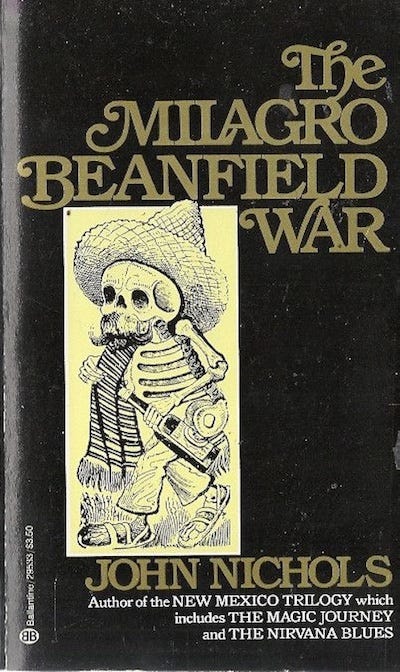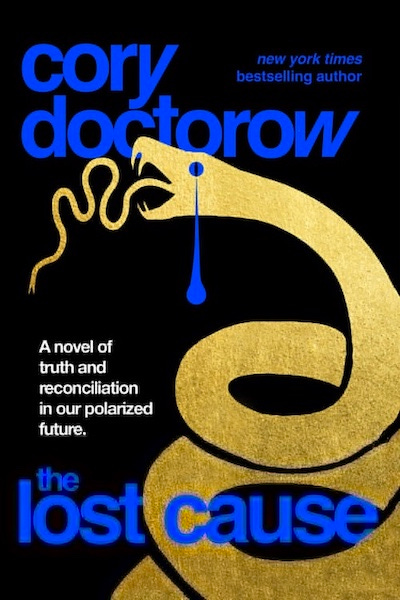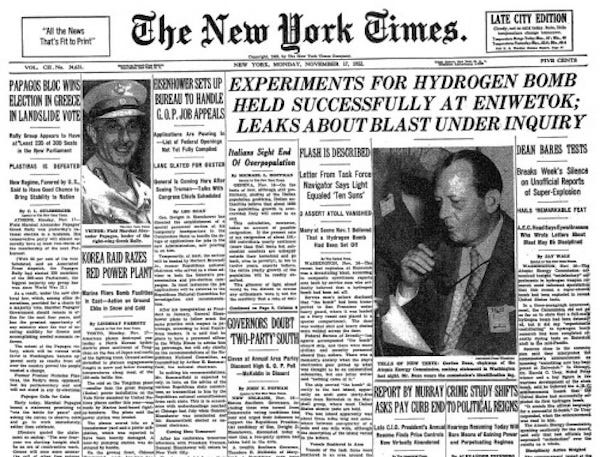Challenged by John Nichols and Cory Doctorow
Two writers worthy of emulation, both of whom have taught me a lot.
New Here?
At Sundman figures it out! themes emerge, interleave, dance around, fade away, and sometimes reappear — like fireflies. The most darling little fireflies, flickering on and off, silently singing I was around, I was around, I was around1. Incidents ramify and their import may change upon being revisited. Ephemeral lightning-bugs of memory and insight, tales of long ago and far away, and of yesterday once more. So the more Sundman figures it out! posts you read, the more connections you’ll see & the more fun you’ll have. Bem vindo, pirilampo!
Stranded at 12th and Broadway
Around 6:15 PM on Wednesday, November 29th, I emerged from the uptown “2” train at the northeast corner of 7th Avenue and 13th street in Manhattan, just one block south of Union Square, and began walking towards the legendary Strand bookstore, where Cory Doctorow was to give a talk centered around his new novel The Lost Cause.
It was the first really cold night of the year and the wind was blowing hard from quickly shifting directions as I plodded eastward, in a state of quasi deja vu. Although I hadn’t been in that part of New York City for quite a while I once knew it well: I’m a 1970 graduate of Xavier High School on 16th street, a five minute walk north.
The walk from 7th and 13th to 12th Street and Broadway is only half a mile or so, but it was long enough. The windbreaker I was wearing doesn’t have a thick lining and I had to remove the cap from my bald head and cary it in my hand because the wind kept blowing it off. My pate, hands and ears were quite cold as I walked into the welcoming Strand and found my way upstairs, to the warm, history-filled wood-paneled reading room on the third floor with a well-worn floor and glass-fronted bookcases displaying signed first editions from Mark Twain, William Faulkner, Don Delillo and Dorothy Parker.
Two writers
Cory Doctorow and John Nichols are two writers who, on a superficial level, have little in common. (Or in John’s case I should say ‘had,’ as he passed away on Monday, December 4th of this year.)
Cory is a high geek druid who writes knowledgeably about all kinds of technology. He’s a pioneering cyberpunk novelist, a digital rights activist, and an influential blogger. He runs his own email server and he writes his own software when he needs to. He moves around a lot: he might be giving a talk in London, England one day and in London, Ontario the next. His work is relentlessly future-focused.
John Nichols never had an email address. In fact he never used a computer. He typed his books — at the time of his death he was working on a collection of his letters and essays — on a manual typewriter. Although he spent some time in Hollywood as a screenwriter, for most of the last fifty-plus years he could be found in or around Taos, New Mexico. He seldom travelled far. Although he did eventually get a website and write short and funny bio for it, I’m sure he never looked at it. It would be unfair to say that Nichols was a nostalgist, but he was a conservationist, concerned with preserving both the natural environment and the traditions of peoples who had not been sucked into the consumerist monoculture. As much as the novels and nonfiction of Cory Doctorow look to the future, the novels and nonfiction of John Nichols often look to the past.
So yes, Doctorow and Nichols are superficially quite different people and writers. But at a deeper level I find that they are much alike. They share many of the same concerns about society, capitalism, and technology, and they they have similar things to say about the purpose of fiction — and about why they became novelists.
And in any event — and as suits the purposes of this essay — Nichols and Doctorow are linked in my squirrel brain since I know, or knew, both men, and both of them have had significant and beneficial effects on my own writing career.
Timing
At the Strand I spoke with Cory for about five minutes in a little windowless ‘backstage’ warren as he was getting ready to go on (logical) stage. Shortly before 7:00 I resumed my seat among the assembled hackers and geeks patiently waiting for the show of intellectual fireworks for which Doctorow is renowned.
I was on a pilgrimage of sorts: although I had other things to attend to in the city, attending this event at the Strand was the primary reason I had made the trek from Martha’s Vineyard to NYC. I wanted to hear what Cory had to say about the current state of our world, and I also wanted to thank him in person for the introduction he wrote for the forthcoming 25th anniversary edition of my novel Acts of the Apostles.
Cory’s program began at 7 with him reading a generous selection from The Lost Cause. He then gave a short talk about the genesis of the book and the process of writing it during peak Covid lockdown. After that he opened the floor for questions, which engendered a 90-minute long wide-ranging disquisition on all manner of things technological, political, personal, economic, ecological, artistic and philosophical. The intellectual fireworks where on full display.
Just a few days after Cory’s talk I saw that John Nichols had died. His passing was no surprise; Nichols had made no secret of the genetic defect in his heart. From his website:
I used to be the last writer in America without a website, but obviously this is no longer the case. However, I draw the line at e-mail and the Internet. If you want to get in touch with me for any reason you'll have to use snail mail.
You better hurry, though. As of February, 2022 I’m 81 years old, my heart is locked in A-fib, I’m still in terminal congestive heart failure, I take Lanoxin, carvedilol, coumadin and triamterene every day, and my doctor says my aortic valve is really sucking wind.
While the passing of John Nichols came as no surprise, I find that it has hit me pretty hard.
Over the past few weeks I’ve been thinking a bit about similarities in the messages delivered, and the examples set, by both John and Cory, and about how both men have influenced my writing career in one way or another.
John Nichols at Hamilton College
Winters at Hamilton College in Clinton — near Utica, in upstate New York — are legendary: cold, snow-filled, and endless. I remember jumping out of third-story windows in the freshman dorm into snowdrifts, and the sounds of the snowplows clearing paths to dorms and classrooms each year from November through April — and even once for a freak snowstorm in May. At Hamilton it seemed that at least half of the students played hockey (at one skill level or another). It was pointless to resist winter; better to make peace with cold reality.
At Hamilton in the 1970’s the course requirements were simple:
Four courses in the fall; One 'winter study' intensive class in January; Four courses in the spring
The winter study seemed to me a way of meeting the Upstate winter on its own terms. In January at Hamilton there were no parties with beach themes, no looking ahead to spring, no false bravado in the face of the arctic darkness. We each hunkered down into our singular course, cocooned like Shackleton’s explorers in the common room of Endurance.
In my junior year, January 1973, I signed up for a winter study called ‘Opportunities for advice on writing’ to be led by ‘guest professor’ and Hamilton alumnus John Nichols. Nichols’ name was known around campus because his novel The Sterile Cuckoo was set there, and parts of the movie based on it had been filmed on campus just a few years earlier. I don’t remember why I chose that winter study option. I guess I must have been toying with the idea of becoming a writer.
I do remember how I met Nichols. It was at the first meeting of his seminar. We were in a lounge at the Bristol Campus Center, twelve or fifteen students nervously sitting on couches and easy chairs waiting to see what this hotshot writer was like.
He was young and relaxed and without pretense: his glasses were held together with black tape. He outlined the month’s program, saying, in so many words, that he was not there to teach us how to write, but to be available to give his advice as we ourselves figured out how to write, to whatever extent we were motivated to do that.
There were only a few requirements for the class: we had to keep a journal, and we had to work on something we were writing. It was all very relaxed an informal. But before we did anything else, Nichols said, we were to go to the library and look up (on microfiche, presumably) a newspaper from the day on which we were born. He said that when you're a child you pretty much assume that everything started when you got here, but if you presumed to write as an adult you needed to really understand that you were not the center of the universe, that the world was humming along just fine without you before you got here.
If we felt like doing so, Nichols said, we could give him stuff that we had written during the month and he would give us his opinion about it. But how much of our work, if any, that we submitted for his critique was up to us.
Over that month I gave Nichols pages of a story I was working on and he gave me feedback. I also played free-for-all ‘jungle hockey’ with him a few times at the ice arena, and on one or two occasions he joined me and some friends to smoke a joint.
At the end of that month he gave me a summary of his opinion about my work: “You are a writer. If you want to be.” Although I didn’t really believe it, I filed that message away in the back of my head. About the story I wrote during that month I remember exactly nothing.
Cory & I
In February, 2002, Andrew Leonard, the editor of the ‘Technology’ section of Salon, published Hacking the Overmind, a generous review of my first novel Acts of the Apostles (“John Sundman's nanotech thriller is a tribute to geekly passions — and a warning of imminent disaster”). For several weeks following, the front page of Salon’s Technology section contained a short note from Leonard touting two writers recently arrived on the techno-hip scene: me, and some Canadian guy named Cory Doctorow. That was how I became aware of Cory’s existence.
I met Cory in person for the first time fifteen months later at the O’Reilly Emerging Technology Conference in Santa Clara, California, in May, 2002. Cory was helping with the roll-out of the brand new Creative Commons project. He was the first novelist to make his works available for free download under CC license, without DRM (digital rights management) restrictions. He encouraged me to follow him in doing this, and I did, releasing Acts of the Apostles and Cheap Complex Devices under Creative Commons license that very day. So far as I know, I’m the second novelist ever to do that.
In 2004 Cory was in Boston for the Worldcon science fiction convention. I met with him in a nearby coffee shop. My friend Gary Gray recorded our conversation and with his help I later posted it on my blog Wetmachine in three segments of about twenty minutes each — at a time when the word ‘podcasting’ was just starting to appear here and there.
You can read my introductions and hear our conversation — part one ,"Pitchforks and torches;” part two, “The realpolitik of bits;” part three, “Boing boing reunited with its evil twin” — for a taste of the patented Doctorow intellectual pyrotechnics, vintage 2004. From my introduction to our conversation:
As you’ll hear if you listen to the podcast, Cory is an articulate guy who talks fast. In the first part of the interview he talks about: how the United States is “creating trade obligations for itself abroad” and cases where “an appointed bureaucrat from the administrative branch [is] subverting what’s going on with elected representatives in Congress”; ominous proposals to change so called “intermediary liability standards” and ways that lawyered-up bullies use copyright laws to shut down legitimate speech without due process; the World Intellectual Property Organization as a bunch of pipsqueaks who are awakening the sleeping giants of internet stakeholders from corporate boardrooms to average human beans like me and you; and how “people are starting to have a burgeoning consciousness of the politics of information freedom.”
The next time the antiliberal forces try to “burn down the library”, Cory says, we need to be there with pitchforks and torches. Pitchforks and torches! to tell them we won’t put up with it.
The sounds you hear in the background are other people — children mostly– who were hanging about in the lobby. The deep-voiced person who asks the questions, trips over his words, and says “right, right” a lot is me.
You’ll also get to hear me mumbling, muttering, interrupting myself, and being generally inaudible but nevertheless somehow compelling.
Cory and I caught up again briefly at the Boskone SF convention in 2006, by which time he had already achieved sufficient stature to be a featured speaker. Since then he and I had not been in physical proximity until our five-minute conversation at the Strand a few weeks ago.
John Nichols, Midlist Author
Rather than try to explain what John Nichol’s books are like, I refer you to the Splendid review 2 by Kurt Jacobsen of Nichol’s 2022 memoire I Got Mine: Confessions of a Midlist Author.
Novelist and screenwriter John Nichols, a staunch but wonderfully wry leftist, is best known for the comedic laid-back subversive prose style of The Milagro Bean Field War, later made into Robert Redford’s second film. But even that illustrious novel only forms the opening salvo of what became the “New Mexico trilogy”– a gringo magical surrealist rendition of the implacable coming of capitalism for the “Betterment” of Northern New Mexico’s fictional stand-in for Taos, Chamisaville. That’s only the start, for those who think of this migrant New Yorker (and Waspy offspring of a signer of the Declaration of Independence) only as a regional Southwestern writer. Throw into the heady brew his first novel The Sterile Cuckoo (made into a movie boosting Liza Minelli toward stardom), the childhood wartime evocations of The Wizard of Loneliness, a gripping Vietnam novel American Blood, family memoirs, environmental odes, an uncredited but widely known re-write of the Costa-Garvas Oscar-winning film Missing, and many further errant scripting adventures in Hollywood’s crazy climes.
I reconnected with John in 1994 when I began to work in earnest on my first novel. I forget how I discovered his address, but I found it and wrote him a letter telling him I was seriously considering making the leap. He encouraged me to go for it, and at John’s suggestion I attended the Pikes Peak Writer’s Conference (about which, and about my cross-country travel to and from Colorado Springs, by train, to attend it I’ll write some other time). I wrote the first words of the novel that became Acts of the Apostles on the way home from that conference.
As I worked on that book, over the course of a year or 18 months Nichols and I exchanged several letters. He gave me advice on how to get into the proper mindset to be a for-real novelist — that is, how to take seriously my ambitions as a writer. John Nichols was a fearless writer, and I like to think that he imparted some of his courage to me.
Acts of the Apostles: Midwifed by Nichols, introduced by Doctorow
I’m going to publish a new edition with Cory’s introduction and some new remarks by me, both ebook & paperback, before the first day of 2024, or die trying. If I can pull it off, it’ll be done before Christmas.
If you’d like to grab a free ebook of Acts before the new edition with Cory’s introduction comes out, use this link. The price of the paperback is going to go up when the new edition comes out, so if you just want to read the book and don’t care about front & back matter, you should grab the current edition (with an introduction by molecular biologist George Church) before the new edition comes out.
Nichols to jrs, 1995
Someplace — unless I’ve lost them to the ravages of time — I have a few more of the letters I received from John Nichols in the mid 1990’s. For now this (below) is the only one I can find. The text is in the ‘alt’ for the image below.
There’s one classic Nichols letter that I will share with you at some point if I ever find it: a photocopy of the account he wrote of his wedding (his third wedding, I think?) to his 19 year old girlfriend when he was in his mid-fifties.
In this letter he gives us an unforgettable image of his bride, standing before the judge who was to perform the ceremony, dressed for the occasion in bluejeans and sneakers, and wearing a backpack. At the judge’s insistence she removes the bubblegum she had been chewing — but the backpack stays on. When, after the ceremony, she says it’s time to consummate their marriage, John points out that he has only recently had open-heart surgery. She replies that she is now his wife and as such has not only physical needs but rights to have them taken care of as well. And so, dutiful husband that he is, he does so, in his hospital bed, with tubes and wires attached.
I say again without any fear of contradiction that John Nichols was a fearless writer.
You mean everything didn’t start with me?
I thank John Nichols for causing me to look up, in January, 1972, the front page of the New York Times from November 17, 1952, where an important milestone on the road to the thermonuclear era was noted:
The publisher’s description of John Nichols’ “I got mine: confessions of a midlist writer” contains these paragraphs:
Beginning with his first novel, The Sterile Cuckoo, published in 1965 when he was just twenty-four, Nichols shares his highs and lows: his ambivalent relationship with money; his growing disenchantment with the hypocrisy of capitalism; and his love-hate relationship with Hollywood--including the years-long struggle of working with director Robert Redford on the film version of The Milagro Beanfield War, which was filmed around Truchas and featured many of Nichols' northern New Mexico neighbors.
Throughout I Got Mine Nichols spins a shining thread connecting his lifelong engagement with progressive political causes, his passionate interest in and identification with ordinary people, and his deep connection to the land.
As much as these words describe Nichols, they strongly remind me of my friend Cory as well. Just change those last two words from “the land” to “our common future” and they pretty much apply.
cf my essay Nadine the Travel Agent. But fair warning: it is emphatically nsfw.
I took the liberty of heavily editing that excerpt.







![4-13-95 Thanks fr the xmas letters, dude. They were fun I envy you the life on the Vineyard . Good luck writing! I’m still plodding on a novel begun in 1988. Slow life of the snail. Get used to it. Though you’ll probably have a bestseller next year! So it goes! Carry on! [signed] Blessings [cartoon face] john nichols 4-13-95 Thanks fr the xmas letters, dude. They were fun I envy you the life on the Vineyard . Good luck writing! I’m still plodding on a novel begun in 1988. Slow life of the snail. Get used to it. Though you’ll probably have a bestseller next year! So it goes! Carry on! [signed] Blessings [cartoon face] john nichols](https://substackcdn.com/image/fetch/$s_!tc2L!,w_1456,c_limit,f_auto,q_auto:good,fl_progressive:steep/https%3A%2F%2Fsubstack-post-media.s3.amazonaws.com%2Fpublic%2Fimages%2Ff368e8c4-3f80-40f0-94fe-c4eb1465902c_839x1087.jpeg)

I really enjoyed this. “You are a writer. If you want to be” is a piece of priceless encouragement. You have certainly earned that encouragement.
It’s 4:30am in Tokyo. I’ve settled into my black leather club seat with my first coffee and opened this. I’m so glad to have read it.
I’ve been discovering not only you and a few very much other fine writers here, but for the last year or so Mr Doctorow via his email server. Cyber punk, sci fi, techno whatever is not at all my interest in life but end-stage capitalism and as you say digital rights activism are. Yes, that man has had a big influence on the way I think about what’s going on all around us.
Btw in your piece today I adore the bleak/give up hope descriptions of winter at the boys school. Very very far from my west coast childhood but I laughed and shivered. Shackleton-level endurance and clearing walkways and diving out third floor windows into piled up snow banks. And hahahah hockey, to greater or lesser extent.
Fine writing and subjects. Thanks.